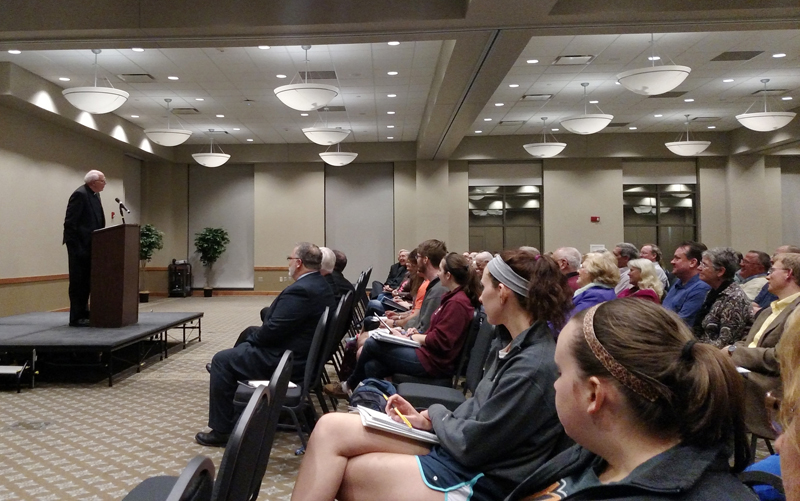By Barb Arland-Fye
The Catholic Messenger
Theologian Msgr. Kevin Irwin recalls a conversation with a friend over lunch in the early 1990s that turned to the topic of ecology. His friend observed that what she was reading about ecology was really broad, but not deep. She asked him to explore the topic in depth. Her request intrigued Msgr. Irwin, whose work focuses on the liturgy. He thought about how the liturgy is rich with the things of the earth, bread and wine and water among them. The U.S. bishops’ conference had also begun addressing the topic of ecology and Pope John Paul II titled his 1990 World Day of Peace message “Peace with God the Creator, Peace with all of Creation.” Thus began Msgr. Irwin’s exploration of the intersection of a theology of ecology with the church’s celebration of liturgy and the sacraments, he said in an interview March 8 at St. Ambrose University in Davenport.

Theologian Msgr. Kevin Irwin discusses liturgy during a talk at St. Ambrose University in Davenport March 8.
Msgr. Irwin visited the university to give the St. Ambrose University Chair of Catholic Studies lecture, titled “The Eucharist is Justice.” He is the past Dean of the College of Theology and Religious Studies at Catholic University of America and worked with the Environmental Justice Committee of the U.S. Conference of Catholic Bishops in the 1990s.
“We knew there were many directions the Chair of Catholic Studies could take considering the wide scope of topics addressed by Catholic Social Teaching,” said Father Chuck Adam, the university’s chaplain. “But then came the publication of Pope Francis’ encyclical letter “Laudato Si” — on care of our common home. And after reading the final chapter — with its beautiful language on spirituality and ecology and the Eucharist — it seemed the perfect topic for this year. Msgr. Kevin Irwin, widely appreciated for his work in liturgy, spirituality, quickly came to mind.”
The theologian describes “Laudato Si” as profound, comprehensive and invitational in its style. It incorporates spirituality, education, justice, poverty, global warming and greenhouse gases, multinational corporations, liturgy and sacrament and prayer, he observed.
“… People have asked me if I’ve read it. The better question is, ‘Have I prayed over it?’” Msgr. Irwin told The Catholic Messenger. “I say this document is to be prayed over and that’s the starting point. At the end of the day we’re a teaching church and a praying church and an ethical church. If we take this seriously there can’t help but be an attitudinal change made in ourselves that hopefully is going to be supported by our leaders and influence our politicians.”
The Holy Father noted in “Laudato Si” that one-third of all food produced is wasted. “What’s the problem here?” Msgr. Irwin asked. “It’s politics. Leadership is not getting the food to the people. What do we need to do? Be a voice for the voiceless. We need to remind our legislators there’s a problem here. If one in five children go to bed hungry, what’s wrong here?” Nourished by the Eucharist, the bread of life, Catholics are to provide sustenance to those in need.
Another life-impacting issue: water. A recently released survey stated that “four billion people on this planet are affected by not having enough potable water. That’s over half the world’s population. Pope Francis has said potable water is a right,” Msgr. Irwin noted. “So pollution isn’t just (a problem) in Flint, Mich. … If you look at the Middle East, the conflict between the Israelis and the Palestinians has a lot to do with water.”
Water, an element that human beings cannot live without, is also essential in the sacramental life of the church. The waters of baptism symbolize Christians’ entry into eternal life. Msgr. Irwin sees this as another example of the intersection between a theology of ecology and the church’s celebration of liturgy and the sacraments. “What we pray in the liturgy is what we believe and that shapes how we live our lives.”
Through the liturgy, Catholics should become more aware of the goodness of creation, the value of human work, the labor that goes into making bread and wine. That in turn leads to a sense of responsibility for resources like water and food and the way that we then share what we’ve been so generously given, Msgr. Irwin reflected.
He spoke of the diaconate, which began in the early days of Christianity with the responsibility of being in charge of sharing food with the poor. How does that fit in the schema of today’s liturgy? Msgr. Irwin asked. If deacons were to take up the offertory and distribute it to the poor, “it would give the diaconate more meaning … that’s a real personification of relaying what we do in liturgy with life in terms of the deacon being that bridge.”
One of the purposes of liturgy, he noted, “is to help us put life back in proper order. The Just One puts us back in proper order by feeding us and challenging us in the liturgy and then helping us to live our lives.” The fact that “we fail and we don’t do it perfectly is why we have to do it every day.”
But a major challenge to the liturgy is the “me-first” culture. People forget that the liturgy “is not about me; it’s about us together … I think we have a long way to go to uncover the riches of the liturgy as something that has to do with relationships to God and to each other,” Msgr. Irwin observed. “If we live in isolation, whose feet do we wash? That’s who we are as Catholics. We wash each other’s feet.”
He sees a great need for better catechesis on the liturgy, but most importantly, he wants to emphasize a sense of hope. “Certainly the liturgy prevents us from being pessimistic; there is always something hopeful about it; that God has not abandoned us. We’re in this together and it’s something important to remind ourselves about especially when things seem to be going poorly.”











